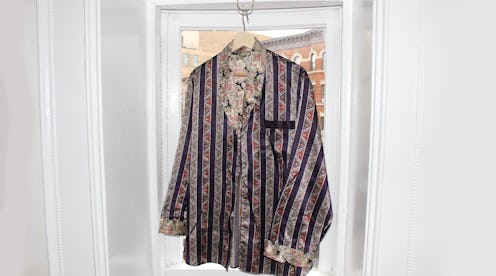(Fashion)
How A Hand-Me-Down Shirt Helped Me Get Through The Hardest Breakup Of My Life

Heartbreak is a fickle beast. One day, you're optimistic — the anxiety of impromptu tears in public has dissipated and you just might wish well for your ex. Next day, the pendulum thrashes in the opposite direction and the mere act of looking someone in the eyes is a towering feat. When you're vulnerable like this, small, tactile comforts matter. Seven years ago after my hardest breakup to date, a friend had me over in an earnest attempt to console me with a home-cooked meal and a gift: a hand-me-down shirt. We sat on the ground around her coffee table and spoke as I meekly pushed the grains around my plate with a fork (another characteristic of my heartbreak: loss of appetite). It's been too long to remember precisely what I said that prompted her to jump up from our meal and run to her bedroom, but I imagine it was something along the lines of "I feel lonely."
A minute or so later, my friend returned with something in her hands. A silky button-down shirt crafted in an elegant paisley print with notes of gold and deep purple. "It was my dad's," she explained. My friend's parents immigrated to America from Afghanistan before she was born and the Afghani blouse had been passed on to her. "Wear it when you are feeling lonely, I think it will comfort you." I viscerally remember the physical feeling of her handing the shirt over to me; knowing it was one of those rare instances of symbolism happening in real-time. Her parent's love was passed on to her and now that support (by way of this wearable keepsake) was being bestowed on me. I got home that evening and slept in the shirt. And for many nights after that.
Clothing as a transformative, protective force has been a recurrent motif throughout literary and cinematic history. Dorothy's ruby red slippers in The Wizard of Oz comes to mind. But beyond fiction, there's a reason why when someone in a family passes away, their clothing and jewelry are distributed among children and grandchildren — we have something to gain from those hand-me-downs. Slipping into another's garment is giving yourself permission to inhabit that person's point of view and reflect on your own identity. It can be pretty powerful if you let it.
When my grandmother died 10 years ago I could barely handle the process of going through her belongings with my mom, aunts, and sisters. But, gradually, the routine of plucking each of my grandma's pieces from the closet, collectively reminiscing its history, chuckling at the used tissues in all of the pockets, and deciding who to hand what down to became a heartwarming (albeit heart-wrenching) activity. I still have several clothing and jewelry pieces that belonged to my grandma and every time I wear them I think of her, embody her selfless and kind spirit, and blurt out with pride, "IT WAS MY GRANDMA'S" when anyone gets anywhere close to complimenting the item. Hand-me-downs keep us close to each other and teach us who we want to be.
Earlier in October of this year, I moved out of my New York apartment of five years and relocated to Brooklyn. Amidst the shuffle of cleaning out my closet, I unearthed the hand-me-down shirt my friend gave me so many years ago. The shirt that got me through the breakup. The shirt that imparted wisdom and warmth during my darkest moments. The shirt, I realized, I didn't quite need anymore. Although some hand-me-downs stay with us for the rest of our lives (like my grandmother's jewelry), others — like my friend's dad's shirt — warrant a second life. And a third. And a fourth. Those special relics that serve as armor and comfort are best worn when guiding someone through a hard time.
As the world navigates this unparalleled holiday season when so many individuals are experiencing loss and loneliness, I can't help but wonder how helpful it would be if we all could lean on a hand-me-down for a bit of relief. I suspect many of you might already own a piece such as this buried away somewhere in your closets — perhaps it's time to bring it out?
This article was originally published on